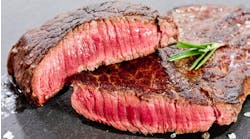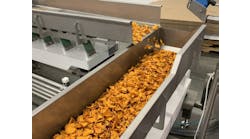After moving to New York, the founder of 2012 Food Processing's Processor of the Year, Chobani founder and CEO Hamdi Ulukaya found that America's yogurt just wasn’t as delicious and wholesome as it was back home in his native Turkey. He believed everyone deserved better options, so he set about making delicious, nutritious, natural and accessible Greek yogurt right here in the U.S.
Ulukaya started 10 years ago with a shuttered former Kraft yogurt factory in South Edmeston, N.Y. But as the company broke the billion-dollar sales level and began exporting internationally, a new plant became a necessity. A gleaming state-of-the-art facility in Twin Falls, Idaho, was the world's largest yogurt factory when it opened in early 2013. It cost approximately $450 million to complete and is capable of processing 18 million lbs. of milk per week.
As one might imagine, pressures on throughput, quality and consistency are much higher for a billion-dollar company than for a startup. The Idaho plant has some of the world's most sophisticated instrumentation, including some 2,000 flow meters, some of them magnetic flowmeters and some mass (coriolis) meters.
Keeping all those flowmeters calibrated plus managing and documenting all that work was a huge task, discovered Jose Trelles, maintenance manager at Chobani's Twin Falls plant. Chobani was looking for a calibration management solution to increase the quality of its processes to the highest standard possible, in accordance with internal and external quality standards like SQF (Safe Quality Foods).
Chobani also wanted to be able to manage and execute those calibrations internally, instead of using the instrument vendor's service team. Besides quality improvements, the calibration solution needed to increase the overall efficiency and should be easily scalable to other production locations.
With a lot of other business issues on its plate, Chobani was looking for a partner to support all of these calibration and documentation needs. The partner needed to be knowledgeable and competent in calibration processes and management, able to execute calibrations with their experienced calibration technicians according to standard operating procedures (SOPs) ensuring repeatability and consistency of the quality, and able to train Chobani’s technicians on-site.
The produced calibration certificates also needed to be traceable to the National Institute of Standards and Technology (NIST) and manageable in such a way that information could be efficiently retrieved and analyzed by Quality Management or a third-party auditor.
After much research, Chobani contracted with Endress+Hauser Inc., Greenwood, Ind. "Our solution first was to understand all the measuring instruments available in the plant," says Ben Keizers, Endress+Hauser's product business manager services. "To save on project costs, it was decided to perform calibrations of all measuring instruments to establish a baseline. At the same time, important instrument data was captured along with calibration specific information, such as criticality and MPE [maximum permissible error] recommendations."
Endress+Hauser first conducted a calibration management workshop to determine the critical steps needed to provide a total integrated calibration management solution that met Chobani’s requirements and expectations. The vendor created SOPs for five measuring principles ensuring consistency and repeatability for all performed calibration work.
Then calibrations were performed together with an on-site installed base assessment to gain a complete overview of the measuring instruments within the Chobani plant. The outcome provided Chobani with a complete and consistent measuring instrument information overview, improved audit trail and improved preventative maintenance.
Endress+Hauser then assessed and categorized all instruments by critical importance to determine calibration parameters such as maximum permissible error, calibration frequencies, criticality, etc.
The assessed instrument information with calibration certificates is stored in Endress+Hauser’s documentation management system W@M. This provides a place to locate critical information quickly. In the next phase it is planned that the W@M system will interface with the calibration management solution.
Endress+Hauser provided training to Chobani employees ensuring upkeep of the calibration work and the installed base information. This provides Chobani with greater quality assurance and increases certainty and clarity in audits.
The results were:
- Increased productivity, efficiency and consistency due to improved preventative calibration plan supporting the audit efforts.
- Reduced downtime – Through a greater level of confidence, Chobani technicians are effectively handling critical items on the product lines during (un)planned shutdowns, resulting in downtime reduction with a savings of a minimum of $7,500 per incident.
- Product loss reduction and quality improvement - Calibrations identified deviations in critical measuring points that caused “production yield” losses.
The next step for Chobani will be to implement the Calibration Management Solution as recommended from Endress+Hauser. First E+H’s Calibration Management System CompuCal will be put in place. This system will interface with Endress+Hauser’s Documentation Management System, W@M and Chobani’s work order system, Infor, creating a paperless calibration management system resulting in efficiency gains and error reduction. At the same time Chobani will have quick access to asset information reducing time and cost needed to obtain critical information.
“Working with Endress+Hauser was easy and they met all of our needs in a flexible way," says Trelles. "Their technicians were easy to work with, very knowledgeable and efficient in execution. From start to finish, Endress+Hauser provided us with all the necessary tools to succeed – from quality, execution, materials, training, knowledge of instrumentation, calibration, and more. Endress+Hauser proved to be a total calibration solution provider.”

